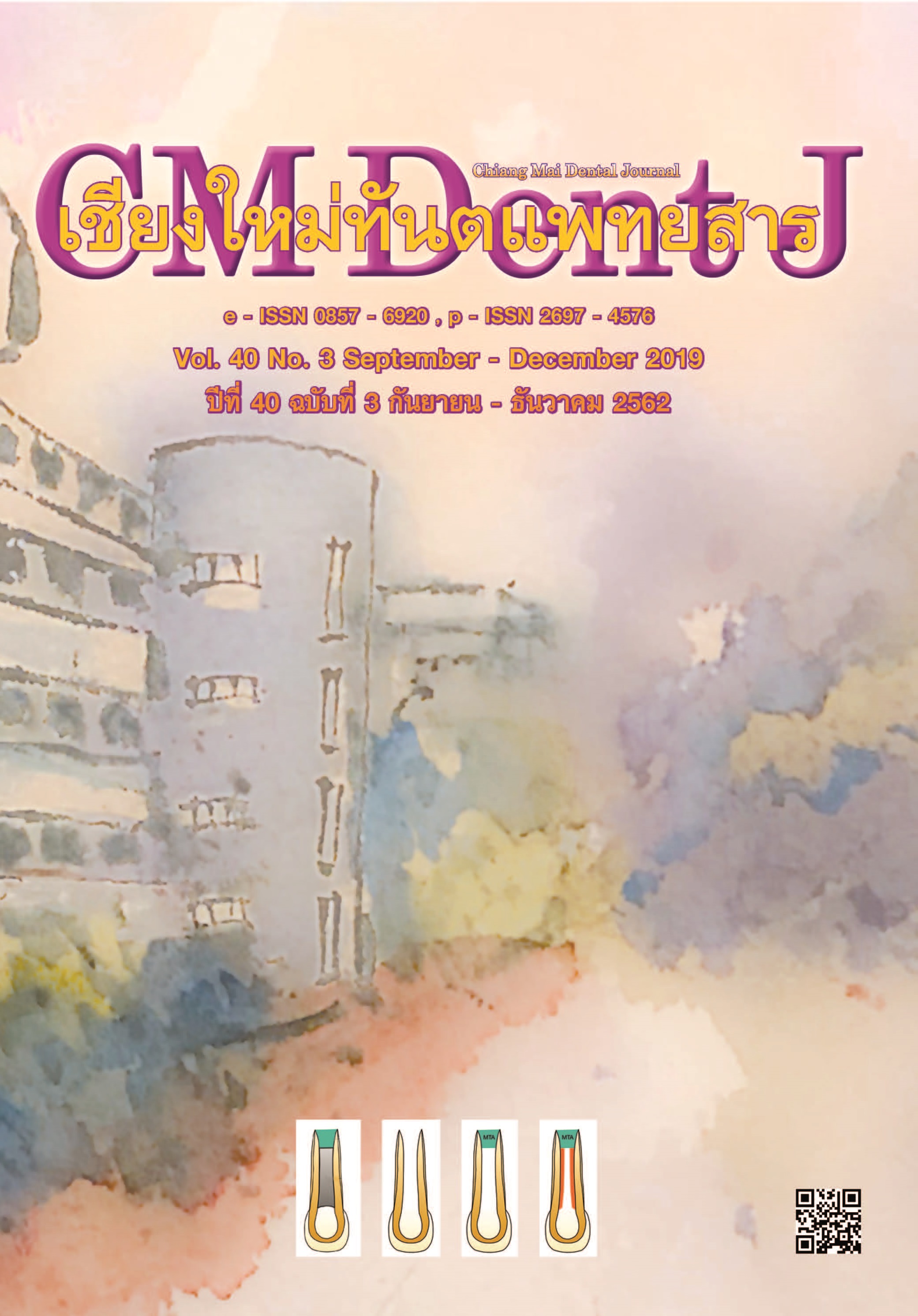The Influence of Occlusal Plane Variation in Normal Range to the Stability of Bilateral Sagittal Split Ramus Osteotomy in Skeletal Class III Deformity
Main Article Content
Abstract
Orthognathic surgery is the procedure to correct dent ofacial deformity. The success of orthognathic surgery is dependent on esthetic, function and the stability of the skeleton. Surgical relapse from stability failure can result in unexpected outcome. The purpose of this study was to compare the rate of postoperative skeletal relapse in 6 months and 2 years after bilateral sagittal split ramus osteotomy in patients with skeletal class III deformity among the lower range (4˚ to < 7˚), middle range (7˚ to < 10˚) and upper range (10˚ to 12˚) of normal occlusal plane angle (Frankfort’s plane - occlusal plane 8˚±4˚). Lateral cephalometric films were evaluated at preoperative time (T0), immediate postoperative time within 2 weeks post operation (T1), 6 months postoperative time (T2) and 2 years postoperative time (T3).The proportion of the patients who had relapse versus who had no relapse between 3 groups were compared using Chi-square test and the distances of skeletal relapse were compared between groups with Kruskal Wallis and Mann Whitney U test. The results showed that the relapse was not significant between 3 groups at 6 months and 2 years after surgery (p<0.05). Conclusion, the results suggest that the difference of the occlusal plane angle; upper, middle and lower range, does not affect the skeletal relapse in this study.
Article Details
References
Tomaszewska A, Kopczyński P, Flieger R. Genetic basis of mandibular prognathism. Arch Biomed Sci 2013; 1(2): 16-19.
Obwegeser HL. Orthognathic Surgery and a Tale of How Three Procedures Came to Be: A Letter to the Next Generations of Surgeons. Clin Plast Surg 2007; 34(3): 331-355.
Monson LA. Bilateral sagittal split osteotomy. Semin Plast Surg 2013; 27(3): 145-148.
Trauner R, Obwegeser H. The surgical correction of mandibular prognathism and retrognathia with consideration of genioplasty. Oral Surg Oral Med Oral Pathol 1957; 10(7): 677-689.
Bailey L, Cevidanes LH, Proffit WR. Stability and predictability of orthognathic surgery. Am J Orthod Dentofacial Orthop 2004; 26(3): 273-277.
Eggensperger N, Smolka K, Luder J, Iizuka T. Short- and long-term skeletal relapse after mandibular advancement surgery. Int J Oral Maxillofac Surg 2006; 35(1): 36-42.
Wolford LM, Chemello PD, Hilliard F. Occlusal plane alteration in orthognathic surgery—part I: Effects on function and esthetics. American Journal of Orthodontics and Dentofacial Orthopedics. 1994;106(3):304-16.
Yang HJ, Hwang SJ. Contributing factors to intraoperative clockwise rotation of the proximal segment as a relapse factor after mandibular setback with sagittal split ramus osteotomy. J Craniomaxillofac Surg. 2014;42(4):e57-63.
Kim YK. Complications associated with orthognathic surgery. J Korean Assoc Oral Maxillofac Surg 2017; 43(1): 3-15.
Luchi ea. Assessment of the Postoperative Stability of Mandibular Orthognathic Surgery for Correction of Class III Skeletal Malocclusion. J Craniofacial Surge 2017; 28(1).
Espeland L, Stenvik A. Long-Term Outcome of Orthognathic Surgery, Principles in
Contemporary Orthodontics, Dr. Silvano Naretto (Ed.), ISBN: 978-953-307-687-4, InTech, Available from:
Beukes J, Reyneke JP, Becker PJ. Medial pterygoid muscle and stylomandibular ligament: the effects on postoperative stability. Int J Oral Maxillofac Surg 2013; 42(1): 43-48.
Moen K, Wisth PJ, Skaale S, Boe OE, Tornes K. Dental or skeletal relapse after sagittal split osteotomy advancement surgery? Long-term follow-up. J Oral Maxillofac Surg 2011; 69(11): e461-468.
Larry M Wolford ELLS. Orthodontics for Orthognathic Surgery. In: Milo M, editor. Peterson's Principle of Oral and Maxillofacial Surgery. 2nded. P.O. Box 620, L.C.D.1, Hamilton, Ontario L8N 3K7: BC Decker Inc; 2004. p. 1111-1134.
Tabrizi R, Nili M, Aliabadi E, Pourdanesh F. Skeletal stability following mandibular advancement: is it influenced by the magnitude of advancement or changes of the mandibular plane angle? J Korean Assoc Oral Maxillofac Surg 2017; 43(3): 152-159.
den Besten CA, Mensink G, van Merkesteyn JP. Skeletal stability after mandibular advancement in bilateral sagittal split osteotomies during adolescence. J Craniomaxillofac Surg 2013; 41(5): e78-82.
Christof Urs Joss IMV.
Rao SH, Selvaraj L, Lankupalli AS. Skeletal stability after bilateral sagittal split advancement and setback osteotomy of the mandible with miniplate fixation. Craniomaxillofac Trauma Reconstr 2014; 7(1) :9-16.
Frey DR, Hatch JP, Van Sickels JE, Dolce C, Rugh JD. Alteration of the mandibular plane during sagittal split advancement: short- and long-term stability. Oral Surg Oral Med Oral Pathol Oral Radiol Endod 2007; 104(2): 160-169.
de Haan IF, Ciesielski R, Nitsche T, Koos B. Evaluation of relapse after orthodontic therapy combined with orthognathic surgery in the treatment of skeletal class III. J Orofac Orthop 2013; 74(5): 362-369.


